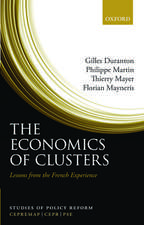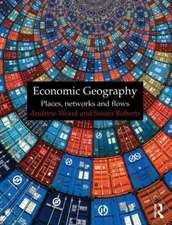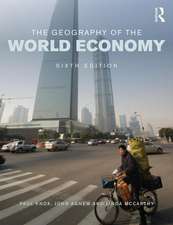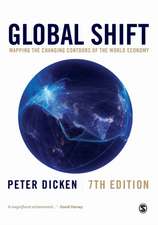Alternative Capitalisms: Geographies of emerging regions
Autor Robert Gwynne, Denis Shaw, Thomas Klaken Limba Engleză Paperback – 30 mai 2003
Drawing on the experience of Eastern Europe, the former Soviet Union, Latin America and East Asia in particular, the authors seek to illuminate the many contradictions in contemporary discourse on the so-called 'emerging regions', and look forward to the future and the type of world that might develop away from the core advanced economies.
Preț: 198.45 lei
Nou
Puncte Express: 298
Preț estimativ în valută:
37.98€ • 39.23$ • 31.61£
37.98€ • 39.23$ • 31.61£
Carte tipărită la comandă
Livrare economică 26 martie-09 aprilie
Preluare comenzi: 021 569.72.76
Specificații
ISBN-13: 9780340763216
ISBN-10: 0340763213
Pagini: 256
Ilustrații: 1
Dimensiuni: 189 x 246 x 14 mm
Greutate: 0.45 kg
Ediția:New.
Editura: Taylor & Francis
Colecția Routledge
Locul publicării:Oxford, United Kingdom
ISBN-10: 0340763213
Pagini: 256
Ilustrații: 1
Dimensiuni: 189 x 246 x 14 mm
Greutate: 0.45 kg
Ediția:New.
Editura: Taylor & Francis
Colecția Routledge
Locul publicării:Oxford, United Kingdom
Cuprins
PREFACE
PART ONE: CONCEPTUAL FRAMEWORKS
Chapter 1: “EMERGING MARKET COUNTRIES†AND ISSUES OF GLOBALIZATION
Chapter 2: CONCEPTUALIZING THE WORLD SYSTEM
Chapter 3: CAPITALISM, IMPERIALISM AND THE EMERGING
WORLD: AN HISTORICAL OVERVIEW
PART TWO: THE HISTORICAL CONTEXT OF ALTERNATIVE CAPITALISMS
Chapter 4: CENTRAL AND EASTERN EUROPE AND THE
FORMER SOVIET UNION
Chapter 5: CAPITALISM IN LATIN AMERICA AND THE
CARIBBEAN
Chapter 6: EAST ASIA: THE JAPANESE AND CHINESE
DEVELOPMENT MODELS AND THEIR REGIONAL IMPACTS
PART THREE: ECONOMIC DIMENSIONS OF CHANGE
Chapter 7: TRADE LIBERALIZATION, ECONOMIC
TRANSFORMATION AND INTEGRATION
Chapter 8: GEOGRAPHIES OF ECONOMIC TRANSFORMATION
Chapter 9: THE TRANSNATIONAL CORPORATION AND
EMERGING MARKET COUNTRIES
Chapter 10: GEOGRAPHIES OF TRANSNATIONAL CORPORATIONS
IN EMERGING MARKET COUNTRIES
Chapter 11: NEW TECHNOLOGIES AND THE GROWTH OF
SERVICES
PART FOUR: POLITICAL DIMENSIONS OF CHANGE
Chapter 12: MODERNITY AND NATIONALITY
Chapter 13: MODERNITY AND DEMOCRACY
Chapter 14: CONCLUSION: ALTERNATIVE CAPITALISMS
AND GLOBALIZATION
BIBLIOGRAPHY
PART ONE: CONCEPTUAL FRAMEWORKS
Chapter 1: “EMERGING MARKET COUNTRIES†AND ISSUES OF GLOBALIZATION
Chapter 2: CONCEPTUALIZING THE WORLD SYSTEM
Chapter 3: CAPITALISM, IMPERIALISM AND THE EMERGING
WORLD: AN HISTORICAL OVERVIEW
PART TWO: THE HISTORICAL CONTEXT OF ALTERNATIVE CAPITALISMS
Chapter 4: CENTRAL AND EASTERN EUROPE AND THE
FORMER SOVIET UNION
Chapter 5: CAPITALISM IN LATIN AMERICA AND THE
CARIBBEAN
Chapter 6: EAST ASIA: THE JAPANESE AND CHINESE
DEVELOPMENT MODELS AND THEIR REGIONAL IMPACTS
PART THREE: ECONOMIC DIMENSIONS OF CHANGE
Chapter 7: TRADE LIBERALIZATION, ECONOMIC
TRANSFORMATION AND INTEGRATION
Chapter 8: GEOGRAPHIES OF ECONOMIC TRANSFORMATION
Chapter 9: THE TRANSNATIONAL CORPORATION AND
EMERGING MARKET COUNTRIES
Chapter 10: GEOGRAPHIES OF TRANSNATIONAL CORPORATIONS
IN EMERGING MARKET COUNTRIES
Chapter 11: NEW TECHNOLOGIES AND THE GROWTH OF
SERVICES
PART FOUR: POLITICAL DIMENSIONS OF CHANGE
Chapter 12: MODERNITY AND NATIONALITY
Chapter 13: MODERNITY AND DEMOCRACY
Chapter 14: CONCLUSION: ALTERNATIVE CAPITALISMS
AND GLOBALIZATION
BIBLIOGRAPHY
Notă biografică
Robert Gwynne is Reader in Latin American Studies at the School of Geography & Environmental Sciences, University of Birmingham, UK
Thomas Klak is Associate Professor at the Department of Geography, Miami Univeristy - Oxford, Ohio, USA
Denis Shaw is Reader in Russian Geography at the School of Geography & Environmental Sciences, University of Birmingham, UK
Thomas Klak is Associate Professor at the Department of Geography, Miami Univeristy - Oxford, Ohio, USA
Denis Shaw is Reader in Russian Geography at the School of Geography & Environmental Sciences, University of Birmingham, UK
Recenzii
'The book fills an important niche, providing students with a rich and detailed account of the challenges faced by emerging
economies in terms of economic development and democratisation in a global economy that is increasingly dominated by the
world's core countries. The authors show how economics, politics, culture and historical legacies are interacting to establish a variety
of pathways to development - demonstrating that globalization is not imposing uniformity on the world but, rather, making for an
increasingly complex and differentiated world. Geography matters.'
Paul Knox, author of Geography of the World Econom
economies in terms of economic development and democratisation in a global economy that is increasingly dominated by the
world's core countries. The authors show how economics, politics, culture and historical legacies are interacting to establish a variety
of pathways to development - demonstrating that globalization is not imposing uniformity on the world but, rather, making for an
increasingly complex and differentiated world. Geography matters.'
Paul Knox, author of Geography of the World Econom
Descriere
This unique book aims to examine the effects of globalization and economic and political transformations in those parts of the world which are now regularly referred to as 'emerging regions'.














